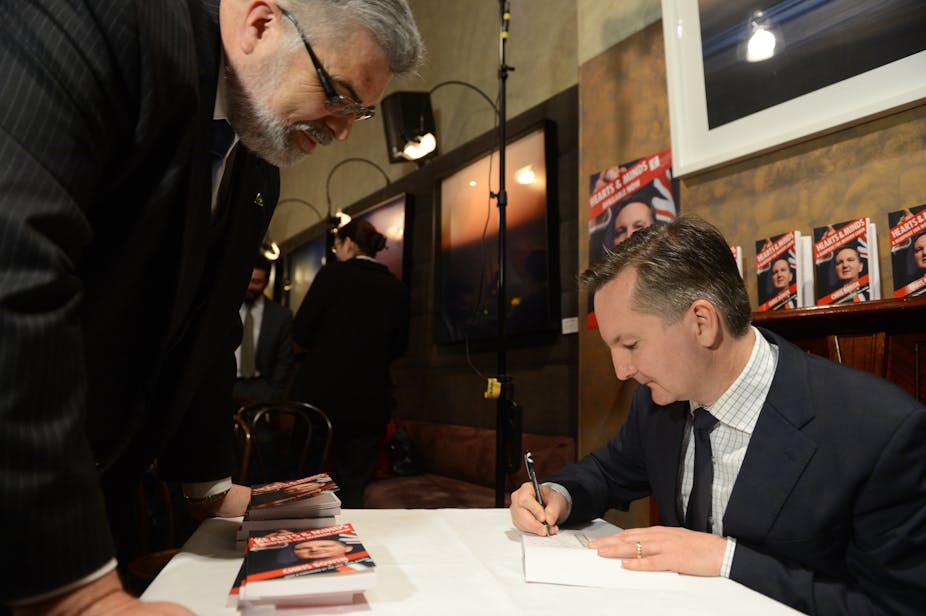Treasurer Chris Bowen’s new blueprint for Labor party reform Hearts and Minds gives us the easy listening version of Paul Keating, just as Tony Abbott offers us the same for John Howard.
The book provides an illustration of the future direction of the Australian Labor Party if those forces that supported Kevin Rudd’s ascension to the leadership continue to have their way within the party. Like Rudd, Bowen’s vision largely eschews the clumsy neo-labourist rhetoric of Julia Gillard and also her evocation of a “socially conservative” working class.
At times however Bowen’s vision verges on the complacent; Labor has brought Australia to the threshold of the best of all possible worlds, and the task of political leadership are to keep Labor in government and to ensure that all Australians share in the opportunities that a high-growth economy offers. Any suggestion that there might be more fundamental problems with Australian capitalism is largely ignored.
Bowen’s definition of the ALP is of a “social liberal party”. He asserts that this ideology is largely equivalent to the “social democracy” or even “democratic socialism” espoused by earlier Labor activists. The argument is stretched a long way here, early Labor’s commitment to a slightly bigger and even whiter Australia was hardly an early version of productivity-enhancing microeconomic reform. Bowen feels secure from the necessity to engage with past labour movements traditions; this is a work that is not only post-socialist but even post the memory of socialism.
This critique scores some points - but ignores the fact that from Bowen’s liberal perspective the greatest threat to economic growth would be the conservative advocates of economic austerity.
Indeed Bowen gives more attention to the Greens rather than the Coalition. Like many in Labor he struggles to find an explanation for the popularity of the Coalition, except perhaps to blame Labor’s alleged alliance with the Greens.
Bowen’s liberalism is also a challenge to the argument of contemporary labourists such as Mark Latham who claim that liberalism emphasises rights at the expense of responsibility. Bowen’s view of Australians society, like that of Tony Abbott, is optimistic and benign. As a former Immigration minister Bowen provides a dutiful defence of current asylum-seeker policy, although he admits that he finds the behaviour of those who seek asylum comprehensible. His brief discussion of indigenous policy ignores the Northern Territory intervention.

To Bowen, modern deregulated Australian capitalism does its job well. His most extended discussion of trade unionism is in the context of Labor party reform, where for Bowen increases in living standards and working environments are the result of economic growth and the initiative of forward thinking employers.
Education and self-employment are to Bowen the avenues of working-class aspiration and opportunity. Bowen does insist that his commitment to opportunity is an agenda much broader than just the identification of talented individuals from working-class backgrounds. The horizons of his vision of education reform are largely set by the Gonski reforms although he does cautiously consider issues around school decentralisation and teacher quality.
The only substantive discussion of economic structure within Hearts and Minds is a paean to small business. Bowen argues that economic prosperity encourages small business formation, although the evidence suggests the opposite. As befits a Labor right-winger from Sydney, Bowen is an enthusiast of the contemporary finance industry. In particular he is a champion of superannuation which for modern Labor has the iconic significance once held by Chifley’s state enterprises.
It is not just the collective action of trade unionism that is absent from Bowen’s vision; he gives little attention to the impact of taxation on income distribution.
He ignores the dependence of many low-paid workers on government income support. At times Bowen does hint at recognition that social structures are not simply the outcome of individual choice facilitated by an enabling social liberal state. An example is his support for a national inquiry into the social determinants of health.
The assumption of prosperity underpins Bowen’s focus on Labor party reform as a means of rebuilding Labor’s fortunes. Bowen’s model of selection of the party leader by an even split between caucus and members has been taken up by Rudd.
Like generations of party critics Bowen advocates direct representation of rank and file party members at the ALP national conference. Most interesting is his argument that Labor adopts the British model and allows MPs to vote independently. He points to the British example but understates the extent to which “rebellions” by MPs are commonplace, even against the “three-line whips” that he falsely believes enforce complete caucus solidarity.
This is a thoughtful book by a boy from the western suburbs of Sydney to whom life has been good. Bowen casts his experience as a template for the possibilities of Labor in government but his optimism faces stern tests in the current economic and political environment. His prospects of party and national leadership will require more than just the hopes of Hearts and Minds.

